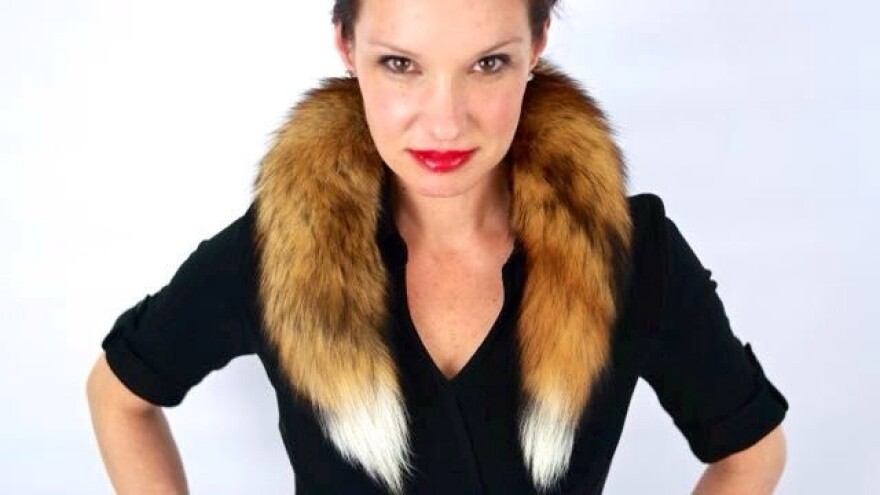Vermonters are familiar with roadkill, and with the tension points between wildlife and human transportation. One woman with Vermont ties has addressed the issue head-on by starting her own business.
Vermont Edition spoke to Pamela Paquin, the woman behind Petite Mort furs. She makes what she calls "accidental fur" – muffs, wraps, scarves, and more – all sourced from roadkill.On the product's conception
Paquin's background is surprisingly not in fashion, but sustainability. She began her work at the MIT Sloan School with the Society for Organizational Learning looking at systems dynamics and leadership within business, which brought her overseas to Europe.
"Denmark produces a large portion of the world’s mink. I would take my ferrets on my days off around to the local furriers and introduce them and say, ‘They’re very sweet, and could you please stop making products out of their cousins?" says Paquin. "That didn’t seem to work."
On her return to the United States, Paquin was "horrified" by all of the roadkill she saw lining the streets.
"We have so much more than these places in Europe where I lived, because we still have so much forest in New England. It was very disturbing, and I was just really upset that I had to drive by, that there was nothing I could do, not even to stop and recognize them," says Paquin.
As a new mother, Paquin searched for something to do that would allow her to balance work with family. Addressing the local roadkill situation inspired her to work with community members in New Hampshire to devise systematic change.
"So I thought well here's a gap, here's an opportunity, here's a very clear place of pain and conflict between us and wildlife," - Pamela Paquin, owner of Petite Mort Furs on roadkill.
"So I thought well here’s a gap, here’s an opportunity, here’s a very clear place of pain and conflict between us and wildlife," says Paquin. "So I got my fur buyer’s license and had some local taxidermists and hunters teach me how to skin an animal."
She learned the fur-making process firsthand, and then worked with a local seamstress to make some pieces to take to Boston and New York City. "The response was brilliant. I started selling pieces immediately," says Paquin.
On 'ethical fur'
To some, ethical fur may sound like an oxymoron.
"I tend to call it accidental fur, because of course we all have a different idea of what is and is not ethical," says Paquin, who exclusively sources her furs from highway departments, animal control officers and wildlife officers.
After receiving a call to collect the roadkill, Paquin and her sources pick up the roadkill, tag it and then use it to make her fur products. This way, she circumvents some elements of the fur industry questioned by activists, like the practices of caging and skilling animals alive.

Each one of Paquin's products has a sterling silver marked badge that marks it both as a Petite Mort fur, and as an ethically produced fur.
"Not only is it clear that it is one of my furs, but it actually has a number on it, engraved in metal, that traces back to my paperwork," says Paquin, who says that her customers range from people who have never worn fur before to habitual fur wearers who just feel better about wearing her product.
Essential to the Petite Mort product is the paper trail that accompanies it. Each animal used is reported and logged by highway patrol and animal control officers, which is why Paquin doesn't accept roadkill donations from individuals looking to clean up their street for a good cause.
The concept of ethical fur is tied to recent movements to consume locally and ethically.
"If you want to go to H&M and buy low priced clothing at Wal-Mart, you are directly contributing to the suffering and death of people. If you wear synthetics and polyesters, that’s petroleum that is killing billions of animals around the globe," says Paquin. "People know about this stuff, they get it, and they want an alternative."
This alternative comes at a cost, however. "There’s providing the alternative, and then there’s also people being able to afford it. So that goes right back into things like raising the minimum wage."
On the Petite Mort product
Due to the small size of their operation, Petite Mort produces accessories including neck muffs, hats, mittens and leg warmers. "Everything that's small and easy to put together, say from one coyote or two raccoons," says Paquin.
Paquin's pieces typically start at $1000, but she is looking to tap into the lower price point market with pompom hats and woolen scarves lined with fur.
"Because each piece typically has about 30 man hours put into it, I would consider cheap at $1000," says Paquin. "If you consider what the average rate of pay is that’s a livable wage in New England, and all of my work happens in New England, then as a single mother, of course I know exactly what it means when you are offered minimum wage, you can’t live on that."
On what's next
Response to Petite Mort has been largely overwhelming, according to Paquin. "I'm going into my second sales season, and I was just awarded the best clothing designer for Boston by 'Best of Boston' for 2015."
Designers and retailers across the globe have reached out to Paquin to purchase her pelts and furs. This support, both domestic and abroad, motivated Paquin to start searching for a factory and fulltime local New England seamstresses in order to meet demand.
"It’s quite a thing," says Paquin. "It’s very touching, and very encouraging."






